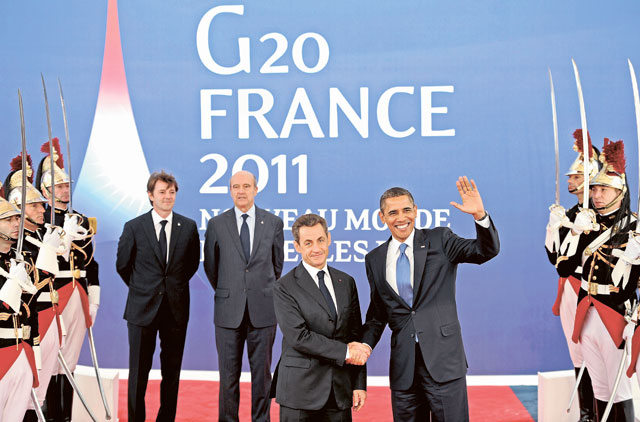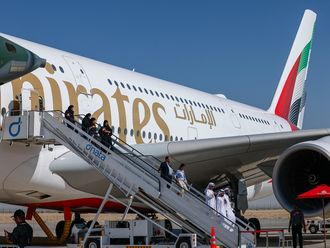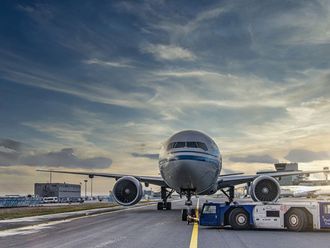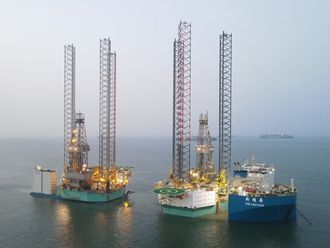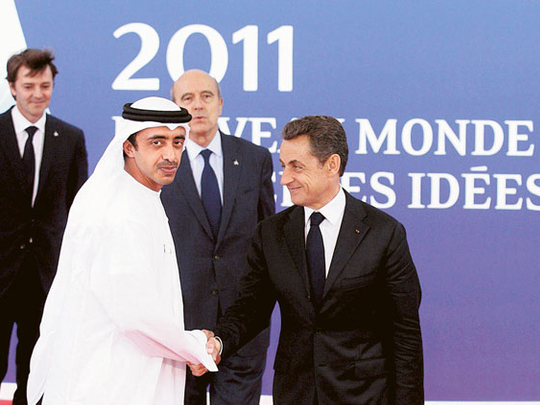
Cannes, France: European leaders' long-delayed admission that a break-up of their cherished common currency was a distinct possibility overshadowed a two-day meeting of the world's largest and fastest growing economies that began in Cannes yesterday.
French President Nicolas Sarkozy welcomed Barack Obama of the US, Hu Jintao of China as well as the leaders of India, Brazil, Russia and the other members of the Group of 20 leading world economies in the city made famous by its annual film festival, but the event is far from the star turn the unpopular French leader had hoped to make six months before he faces a tough re-election vote.
European leaders held another round of emergency meetings yesterday morning about Greece, this time including officials from Spain and Italy — two major Eurozone members whose debts have rattled markets and who are seen as too big for Europe to bail out.
Greek choice
All attention is on what Greek voters will say in a referendum early next month on a sweeping European bailout plan. Sarkozy and German Chancellor Angela Merkel admitted in a late night press conference on Wednesday that they see the vote as a Greek choice between staying in the 17-member club of countries that use the euro or getting out.
A "no" vote could be devastating. It could lead to a disorderly Greek default, topple fragile European banks and send the global economy back into recession — and would threaten the cornerstone of European unity and decades of work toward integration.
Sarkozy and other top EU officials have long held that it was unthinkable for Greece to quit the euro because it would be, the French President has said, "a failure of Europe".
But in the press conference the leaders signalled for the first time that Greece's exit from the euro was indeed possible. Saying that Europe had done everything it could to keep Greece in the Eurozone, Sarkozy said: "Now it is up to them to decide if they want to stay in the euro with us."
That shift was prompted by the shock decision of Greek Prime Minister George Papandreou to call a controversial referendum on his country's $130 billion (Dh477.5 billion) bailout plan in early December that caught European leaders completely off guard and scrambling for a response.
Vote of confidence
European leaders tried pocketbook pressure, saying they would not release €8 billion (Dh40.5 billion) in previously approved loans to Greece until the referendum results are in.
Papandreou, too, called the referendum a vote on Greece's future in the Eurozone — prompting a rift even within his own party. He faces a parliamentary vote of confidence today.
Greek Finance Minister Evangelos Venizelos said: "Greece's position within the euro area is a historic conquest of the country that cannot be put in doubt." He added it was important for the next bailout instalment to be disbursed "without any distractions or delay".
Development Minister Michalis Chrisohoidis issued a statement calling for unity. "There can be no… return to the drachma and the past," Chrisohoidis said. "We must all assume our responsibilities."
The G20 leaders were expected to discuss food security, reform of the international monetary system and the volatility of commodity prices — none of which is expected to get much attention or produce any solid conclusions at a summit so dominated by the European quagmire.
Anti-capitalist protesters have staged demonstrations demanding a tax on all financial transactions, an end to tax havens and more aid for development.
Abdullah leads UAE delegation
Abu Dhabi: Shaikh Abdullah Bin Zayed Al Nahyan, Foreign Minister, leads the UAE delegation at the G20 Summit in France.
Obaid Humaid Al Tayer, Minister of State for Financial Affairs, and Nasser Ahmad Al Suwaidi, Chairman of the Board at Abu Dhabi Council for Economic Development are also part of the dele-gation.
The UAE, holder of the GCC presidency this year, is participating for the first time at the invitation of the French government in its capacity as holder of the G20 presidency.
To coincide with the start of the summit, the UAE has also launched an official website in both Arabic and English in order to make the topics discussed available to Arabic speakers across the Middle East. In particular, the website seeks to engage the region's youth in a dialogue about the key issues facing the region and the world.
The first official Arabic-language website ever created for the G20, UAEG20.ae, is specifically designed to enable people in the UAE and across the region to learn more about the G20 and follow the process online.
Unique opportunity
Shaikh Abdullah said: "Participation in the G20 forum is a unique opportunity for the UAE to expand its cooperation with some of the world's largest economies. This is an important platform for the UAE to share its expertise across a range of policy areas and help develop solutions to the most pressing challenges on the international agenda."
The G20 has a broad agenda and the UAE is committed to actively participating. As such, the UAE has identified five key areas of greatest relevance to the UAE and the region and it is in these areas that the UAE has focused its contributions in recent months. Discussed in detail on the website, these five key areas are: food security and water, climate change and energy efficiency, fossil fuel price volatility, global governance reform, and global economic stability and open investment.


